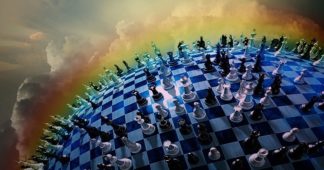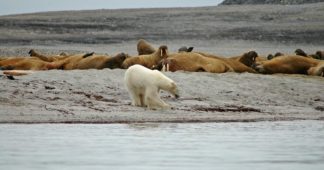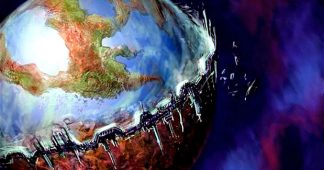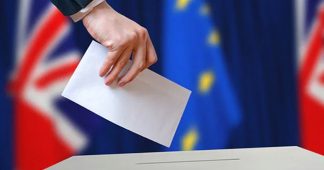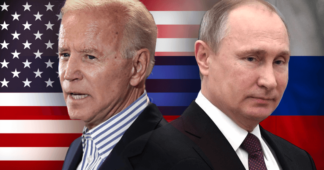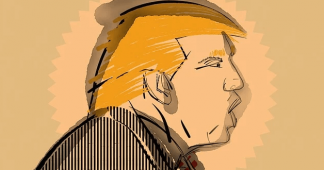By Dimitris Konstantakopoulos (*)
PART I of two parts
We are living through the opening phase of two Armaggedons, and we need to stop both of them before they destroy humanity. The one is the war between East and West, the other the war between Humanity and Nature.
So dramatic are the events taking place today on the planet, so profound the transformations of our world, that our minds find it difficult to grasp their full significance, let alone to analyse the world as a whole and its problems in their unity and interelationships. In such conditions we lack the capacity to act in an effective way in order to address those problems. We are also, very often, incapable of examining any partial solution from the viewpoint of its global repercussions.
The power of inertia, the fear of what awaits us and various strong financial and political interests are driving us into thinking in terms of an era and an international system that are finally passing away. What the great French geneticist Albert Jacquard once wrote has never been so timely as today: the greatest obstacle to understanding reality is none other than the limits of our imagination.
For instance, there is a lot of debate nowadays internationally on how best to address the economic, social, political or geopolitical problems of our world. But the majority of those discussions do not take into account the fact that we have entered an era of human history when, for the first time, the possibility of extinction of humanity is present. We continue to use the intellectual tools of past historical periods, which took for granted the existence of humanity, without modifying them in order to include the possibility of extinction of the human species and the need to avoid it. On the opposite side of the spectrum, ecologists and specialists on weapons of mass destruction are taking this factor into account, but, often, they don’t try to interrelate it with political, geopolitical, economic and social factors. But scientists cannot solve the problems of nuclear war or climatic change. Societies have to do that by using science.
A seriously ill world
Our world was seriously ill even before the Ukrainian crisis erupted. Climate change will become irreversible (thus threatening the very existence of humanity), if radical measures are not taken to reverse it within the next two to three years, according to the recent ICPP reports. No state on earth seemed disposed to adopt such measures even before the present crisis. In an evironment of cold and hot wars, it is clearly impossible to establish the deep international co-operation which is absolutely essential for the climate crisis and all the other threats humanity is confronting (already, the “sanctions war” is leading to an increasing in coal consumption, import of shale gas from the US in Europe and an increase in fossil fuel extraction in the US).
And, although the climate crisis, along with the probability of a nuclear war, is one of the most serious threats to the existence of mankind, it is by far not the only one. All the natural environment which has sustained superior forms of life on Earth (and also the human DNA and mind) are under multiple and potentially mortal threats. The coronavirus pandemic was probably only the first of a series of health crises which risk being increasingly serious. In the same time the world economy was under the threat of a recession even before the Ukrainian crisis and the sanctions war. Global debt, that is, the demands of a handful of private financial institutions from humanity, have reached historically unprecedented levels. The same is true of inequalities between countries and within countries. About half of humanity, 3.3 billion people, live below the poverty line as defined by international organisations, while hundreds of millions are undernourished and lack access to clean water and basic health care.
A sui generis world war against Russia
It was in this situation that the Ukrainian crisis broke out. Responding to the Russian military intervention in Ukraine, the US and its allies and satellites, that is all the advanced capitalist countries of the world, launched a sui generis world war against Russia.
We define it is as a world war because of the extent of its aims, of its global character and of the very real prospect of engulfing other countries like China – and anybody who dares to object to America and the “collective West”. But we define it as a sui generis world war because, for the time being, there is no direct and massive contact between NATO and Russian armed forces, out of the fear that such a direct military conflict would lead, most probably, to a nuclear world war and the annihilation of humanity.
This sui generis world war includes:
– The massive arming of Zelensky’s Ukraine, with ever heavier weapons, the delivery of precious “technical” support to the Ukrainian army and also the expedition of “volunteers” to Ukraine. Let us note at this point that those armaments cannot enable Zelenski’s regime to defeat Russia. What they can do is to ensure the prolongation of the conflict, the further destruction of Ukraine itself and the further bleeding of Russia. (In a way the United States try follow the pattern of the two world wars, which can be undersood also as “civil wars” of Europe and which have accomplished the dream of dominating all European continent, at the exception of Russia. Now this is the equivalent of a “civil war” inside the post-Soviet space, whose aim is the control of the former USSR by the US).
– An economic war against Russia, including the establishment of a regime of global economic sanctions against both Russia and Russian citizens, the application of strong pressure on all countries of the world to sever their relations with Russia, and the confiscation of the property of the Russian state and Russian individuals
– An information war, which includes a massive disinformation campaign, the demonisation of Russia and even the banning of Tchaikovsky, Prokofiev or Shostakovich! Individual Russians are targeted exclusively for their ethnic and racial origin, because they are Russians. It is the first time we see in Western Europe persecutions against people based on the exclusive criterion of national or racial origin since the persecution of Jews and Roma before and during WWII.
The rapidity and the decisseveness in the adoption of all those measures seems to indicate the existence of a planning since many years, long before the Ukrainian crisis erupted.
Is this a war for Ukraine?
We will not discuss in this article the various arguments the West is advancing to justify this policy. We will not discuss the related issues of how the Soviet Union broke up, how Ukraine’s borders were drawn and their legitimacy, the expansion of NATO and the civil war that broke out in that country after the 2014 coup. We are not going to make any comparisons with what NATO countries have done in Yugoslavia, Afghanistan, Iraq, Libya, Syria, Sahel, Yemen and so many other places, during the last thirty years alone. We will not compare western interest in Ukraine with western indifference about the massacre of half to one million people in Rwanda and many other calamities, or the fact that Washington, after destroying Afghanistan during its 20-year military intervention, is now provoking the mass starvation of the population of this state, by confiscating its assets abroad.
We will not remind you what many eminent representatives of the western world, like George Kennan, Henry Kissinger, William Burns and many others have said about Ukraine or NATO’s expansion.
We will not also discuss the fact that all these sanctions, adopted supposedly because Russia has violated international law, they represent themselves a clear violation of this same international law and also of the constitutional order of the western states themselves, which guarantee the right of property.
Let us also assume, for the purposes of our analysis here, that the main western narrative is right all along the line. Let us accept that all the above measures against Russia have being taken in order to help Ukraine defend itself and “punish” Russia and its regime for attacking it and violating international law.
Even adopting the mainstream western assumptions, we have the right to ask the following:
– Do the measures taken help accomplish the stated aims of the West? Will they help Ukraine?
– Are those measures and their consequences proportionate to the problems they claim to address?
– What will be the probable results and consequences of those measures, not only for Ukraine and Russia, but also for the security of the world (and in particular Europe), for the world economy and vis-a-vis other big threats to humanity (like the climate crisis and environmental threats).
– By answering these questions we will also be in a better position to elucidate the real motives and aims of this sui generis world war.
A Regime Change strategy
It is clear that the measures adopted by the USA and its allies or satellites against Russia correspond objectively to a strategy of “regime change” in Russia through provoking a protracted military conflict in Ukraine and the destruction of the Russian economy. The West hopes – and sometimes even admits it – that somebody in Russia will make a coup, or even kill Putin, and that Russia will return to the “normal” situation and re-become a “democratic” state. If we judge by recent (post-1990) history, what the West means when it is using this terminology is the transformation of Russia into a kind of banana republic, as it was under Boris Yeltsin’s rule.
Such a “regime change” strategy has been followed in the past 30 years against Yugoslavia, Iraq, Afghanistan, Syria, Libya, Iran, Cuba, North Korea and Venezuela.
In most cases, this strategy has failed completely for a very simple reason. If one attacks a country from outside, the people tend usually to support its leadership. This strategy has succeeded only in Iraq, Afghanistan and Libya, where the western armed forces intervened massively, and even there the results were only temporary. The Taliban rule now Afghanistan and the US influence in both Iraq and Libya is under serious threat.
The chances that such a strategy will succeed against a power as strong as Russia are near zero: all Russian history testifies to that, including Napoleon’s and Hitler’s campaigns, or the intervention of more than a dozen capitalist states in the Russian civil war. In all those cases and in many others, Russians have mobilised in a way nobody was able to predict, and they crushed the attacking forces.
If this was already true before Russia acquired nuclear weapons, it is much more probable to happen again in conditions of Russia being one of the two nuclear superpowers.
And if this strategy results in a regime change in Russia, this will be a regime change Americans will not appreciate. It is simply impossible to repeat the “perestroika” and Yeltsin experiments, for the very simple reason that the average Russian remembers all too well that those experiments provoked the biggest social, economic and demographic disaster in the whole history of the industrial world, if we judge them by the obsective measures of GDP, investments, capital flight, level of life, demography etc. It is a joke to pretend that those experiments were aimed at establishing, or established, some kind of democracy (i.e. the kratos – power – of the dimos – of the people, the Assembly of Citizens, according to the etymology of the word democracy) in the former USSR.
The possibilty of a chaotic decomposition of Russia is also extremely unlikely. Besides, were it to become probable, a sound person (not the case of most politicians nowdays) should be rather frigthened by the prospect of chaos reigning over a nuclear superpower.
For all the above reasons, the strategy of regime change in Russia will almost certainly fail in its main strategic aim. But even in failing, it may have enormous global consequences. Here are some of them:
1. Increasing the risk of global nuclear war
The only measure the United States and its allies-satellites have not adopted until now is the direct engagement of their armed forces against the Russian army, which would most probably lead to a global nuclear war and the elimination of the human species and other higher forms of life. But even this possibility, namely that life on the planet will end due to the use of nuclear and other means of mass destruction (including for example new artificial coronaviruses or extensive use of cyberweapons), has now become much more likely due to the total character of the war unleashed by the West.
The fact that important arms treaties like the ABM, the INF and the “Open skies” treaties have already been unilaterally repudiated by the United States is also a factor heavily aggravating the international security situation.
Not only do we now lack most legal constraints to unleashing a dangerous arms race potentially leading to nuclear war, but are also destroying the ideological and political foundation behind them, that is the acceptance by everyone of the two nuclear superpowers of the legitimacy of the other, as was reflected in the Kennan doctrine of containment and the Soviet policy of “peaceful coexistence” during the Cold War.
Another aggravating factor is the multiplication of talk about “tactical” nuclear arms. There are no tactical nuclear arms, because even the use of a “small” nuclear weapon will have strategic consequences. Nobody can know what will happen after the use of even a small nuclear bomb. The probability of stopping the escalation of a nuclear conflict after the first use of such a weapon is not very high.
In conditions of a total “sui generis world war” against Russia, there is obviously an increased probability of a nuclear conflict by mistake, by miscalculation or by provocation by the extremist international “war party”. This party existed all along the first Cold War and contnued to exist after it, organized around various groups like the Committee for the Present Danger and its various reincarnations (the last one against China, around the ex-Goldman Sachs executive and Trump’s strategist Steve Bannon, coordinator of a world Far Right network) and various other lobbies like the Neocons, the Project for a new American Century etc. Using often “entryism” and “undergound” tactics inside the western establishment, operating in both US parties and in other international power centres, profiting from the coherence of their strategy (“only war can solve all problems”), they were able to lead all the western system into adopting their strategy in critical moments. They are responsible, among many other things, for allowing 9/11 to happen, for programming and unleashing the Middle Eastern wars, for pushing Trump into the bombing of Syria and his nuclear threats against North Korea. They were pushing continuously for a war against Iran, which could hardly remain conventional.
If we judge by what they do, not by what they say, their main idea is that only war (including nuclear war), or at least the threat of war, can “save the world”. Because their “world” is the American and western capitalist domination of the world (and also the complete Israeli domination of the Middle East).
They know that the majority of the western establishment and the western societies, although they also want the preservation of western capitalist domination on the world, are not ready to risk its destruction in order to dominate it! So they need to create the conditions (including by provocations, as they did for example in Syria in 2013, 2017 and 2018), which will make this war unavoidable. And one such condition is to create a situation when both camps will feel they cannot go back, without suffering a strategic defeat.
During the Cold War, a fundamental obstacle to unleashing a global nuclear war was the realization of the Mutually Assured Destruction, a principle which constitured the foundation of the the ABM and other Arms Control treaties.
The way the Ukrainian crisis is developing, although it has not destroyed – for the time being – this understanding, is already undermining it, with a dangerous poker game being played between Russia and the West, a poker which can easily degenerate into a “Russian roulette” game and which provides ample room for extremists to try provocations.
Nuclear war was avoided, with considerable difficulty, during the first Cold War, because everyone in both camps recognised the legitimacy of the other (this was a fundamental element of both Kennan’s “containement” strategy and of the Soviet policy of “peaceful coexistence). When you begin to treat the opposite side as Hitler, criminal or mad, you destroy any possibillity of a negotiated settlement and any compromise, thus facilitating the unleashing of the nuclear Armaggedon, even if you are not aiming at that.
In any case, one can hardly imagine such a conflict between NATO and Russia continuing and escalating indefinitely, but remaining within safe limits. There is a clear danger to live through a “slow motion”, prolonged Cuban Missile Crisis, much more dangerous, as there are much less communication channels between East and West and many more points of “structural instability” (like the sovereignty questions in different regions of the post-soviet space).
If this world conflict will last for a long time, then any possibillity of nuclear, biological, chemical, space or cybernetic arms control will disappear. By its very dynamic such a conflict will tend to extend to all domains and to all continents.
Towards a climate Holocaust
NATO’s war against Russia, if it continues for much longer, and if steps are not taken to immediately re-create a climate of international co-operation, will ensure the end of humanity due to climate change. As climatologists have repeatedly warned us, the last time being the conclusion of the UN Intergovernmental Panel on climate change, released on April 5, measures to reverse climate change must be taken now, because climate changes are already becoming irreversible. No effective action to reverse this phenomenon will be possible in the future. Earth will enter into another “climate orbit”, where climate change will become self-propelling and will probably lead to a climate incompatible with the preservation of higher life forms.
Taking such measures requires a climate of very deep global co-operation and planning on a world scale, which is why it is incompatible with cold and hot wars. The same is true of all major world problems. The sanctions already entail a multiple burden on the environment, while there is a massive transfer of resources, necessary for any green transition (as well as in the fight against inequalities and other ecological threats), to new armaments programmes.
The deepest irony of the situation is that German Greens (or Blacks?) have now become the protagonists in supporting NATO’s war against Russia, with all its terrible consequences for ecology and the natural environment of the Earth.
(*) You may read find a shorter version of this article here It is high time for the Non – Aligned to intervene in the Ukrainian crisis | Defend Democracy Press
We remind our readers that publication of articles on our site does not mean that we agree with what is written. Our policy is to publish anything which we consider of interest, so as to assist our readers in forming their opinions. Sometimes we even publish articles with which we totally disagree, since we believe it is important for our readers to be informed on as wide a spectrum of views as possible.
